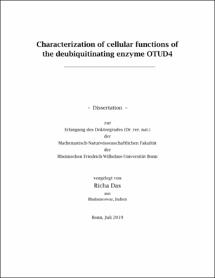Das, Richa: Characterization of cellular functions of the deubiquitinating enzyme OTUD4. - Bonn, 2020. - Dissertation, Rheinische Friedrich-Wilhelms-Universität Bonn.
Online-Ausgabe in bonndoc: https://nbn-resolving.org/urn:nbn:de:hbz:5-59163
Online-Ausgabe in bonndoc: https://nbn-resolving.org/urn:nbn:de:hbz:5-59163
@phdthesis{handle:20.500.11811/8517,
urn: https://nbn-resolving.org/urn:nbn:de:hbz:5-59163,
author = {{Richa Das}},
title = {Characterization of cellular functions of the deubiquitinating enzyme OTUD4},
school = {Rheinische Friedrich-Wilhelms-Universität Bonn},
year = 2020,
month = aug,
note = {Post-translational modification of proteins with ubiquitin influences myriad of cellular processes by affecting protein stability, degradation, localization and protein-protein interactions. Ubiquitin gets transferred to target proteins via an E1-E2-E3 enzymatic cascade. Deubiquitinating enzymes (DUBs) are ubiquitin-specific proteases that counterbalance this process.
The deubiquitinating enzyme OTUD4 was found mutated in the rare Gordon Holmes syndrome associated with hypogonadotropic hypogonadism, ataxia and dementia in humans. OTUD4 is important for embryonic development and structural integrity of cerebellum in zebrafish. However, the molecular function of OTUD4 in neuronal context has remained elusive. To explore this, I performed pull-down experiments from mouse brain lysates to identify new interaction partners. Mass spectrometry analysis revealed that OTUD4 is part of a large network of RNA-binding proteins. Many of its interactions with these RNA-binding proteins are RNA-dependent. This study characterizes OTUD4 as an intrinsically disordered protein that interacts with RNA itself, despite lacking a canonical RNA-binding domain. I propose that OTUD4 engages in unconventional RNA-binding mediated by its intrinsically disordered regions.
Eukaryotic cells contain RNA-protein assemblies known as RNP granules. I show that OTUD4 associates with higher order ribonucleoprotein assemblies: neuronal RNA transport granules and stress granules. Under physiological conditions, OTUD4 colocalizes with RNA transport granules in rat hippocampal neurons. Live cell-imaging reveals trafficking behavior along the neurites, implicating OTUD4 function in the transport of untranslated mRNA and local protein synthesis. Furthermore, upon heat and oxidative stress, OTUD4 colocalizes with stress granules (SG) in mammalian cells. SGs represent sites of stalled translation containing untranslated mRNAs and proteins under stress conditions. Taking into account the impaired SG formation in OTUD4 deficient cells, our findings conclude it as a critical regulator of SG assembly. However, its catalytic activity did not seem to be essential for the process. Its role in integrated stress response is underscored by the observation that cells lacking OTUD4 exhibit impaired SG formation, increased sensitivity and apoptosis, both under basal and post-stress conditions. Taken together, this study reveals important aspects of OTUD4 functionality that might further the understanding of RNA-protein networks and mRNA translation in cells and cellular stress response.},
url = {https://hdl.handle.net/20.500.11811/8517}
}
urn: https://nbn-resolving.org/urn:nbn:de:hbz:5-59163,
author = {{Richa Das}},
title = {Characterization of cellular functions of the deubiquitinating enzyme OTUD4},
school = {Rheinische Friedrich-Wilhelms-Universität Bonn},
year = 2020,
month = aug,
note = {Post-translational modification of proteins with ubiquitin influences myriad of cellular processes by affecting protein stability, degradation, localization and protein-protein interactions. Ubiquitin gets transferred to target proteins via an E1-E2-E3 enzymatic cascade. Deubiquitinating enzymes (DUBs) are ubiquitin-specific proteases that counterbalance this process.
The deubiquitinating enzyme OTUD4 was found mutated in the rare Gordon Holmes syndrome associated with hypogonadotropic hypogonadism, ataxia and dementia in humans. OTUD4 is important for embryonic development and structural integrity of cerebellum in zebrafish. However, the molecular function of OTUD4 in neuronal context has remained elusive. To explore this, I performed pull-down experiments from mouse brain lysates to identify new interaction partners. Mass spectrometry analysis revealed that OTUD4 is part of a large network of RNA-binding proteins. Many of its interactions with these RNA-binding proteins are RNA-dependent. This study characterizes OTUD4 as an intrinsically disordered protein that interacts with RNA itself, despite lacking a canonical RNA-binding domain. I propose that OTUD4 engages in unconventional RNA-binding mediated by its intrinsically disordered regions.
Eukaryotic cells contain RNA-protein assemblies known as RNP granules. I show that OTUD4 associates with higher order ribonucleoprotein assemblies: neuronal RNA transport granules and stress granules. Under physiological conditions, OTUD4 colocalizes with RNA transport granules in rat hippocampal neurons. Live cell-imaging reveals trafficking behavior along the neurites, implicating OTUD4 function in the transport of untranslated mRNA and local protein synthesis. Furthermore, upon heat and oxidative stress, OTUD4 colocalizes with stress granules (SG) in mammalian cells. SGs represent sites of stalled translation containing untranslated mRNAs and proteins under stress conditions. Taking into account the impaired SG formation in OTUD4 deficient cells, our findings conclude it as a critical regulator of SG assembly. However, its catalytic activity did not seem to be essential for the process. Its role in integrated stress response is underscored by the observation that cells lacking OTUD4 exhibit impaired SG formation, increased sensitivity and apoptosis, both under basal and post-stress conditions. Taken together, this study reveals important aspects of OTUD4 functionality that might further the understanding of RNA-protein networks and mRNA translation in cells and cellular stress response.},
url = {https://hdl.handle.net/20.500.11811/8517}
}






